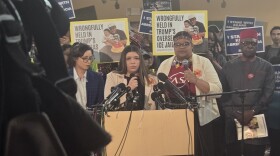Hymns of resistance echoed through the rain outside the federal courthouse in Greenbelt where, once again, Kilmar Abrego Garcia’s return to Maryland was delayed.
The Trump administration says it needs more time to comply with a federal judge’s ruling to return a Prince George’s County resident who was “mistakenly” sent to an El Salvador prison.
Judge Paula Xinis ruled that there will be a new hearing on Wednesday and in the meantime, the court is demanding daily updates on the government’s moves to bring Abrego Garcia back to the country.
In a status conference Friday, the U.S. government could not provide the judge any details about Abrego Garcia’s physical status or about the steps it has taken to return him or future plans to do so.
“The government attorney did say that they intend to comply with the order and bring him back. That's the bare minimum. They should have done that already,” said Simon Sandoval-Moshenberg, an attorney representing Abrego Garcia and his family, in a press briefing following the half-hour long status conference. “They've had plenty of time between the Supreme Court's order early yesterday evening, and now he should be here in the United States. It's a five hour flight.”
Early Thursday evening, the Supreme Court unanimously largely upheld an order from federal judge Paula Xinis to bring Abrego Garcia to the United States. Hours later after the highest court’s decision, Xinis issued a new order mandating the federal government “take all available steps to facilitate the return” of Abrego Garcia back to the United States “as soon as possible.”
The Justice Department tried to delay the Friday afternoon status conference but Xinis rejected that move.
Xinis set a Friday morning deadline for the government to provide information on Abrego Garcia’s “physical and custodial status,” as well as updates on what the government has done so far to bring him home and what the next steps are to complete that process. Federal lawyers wrote that it “is unreasonable and impracticable” for the government “to reveal potential steps before those steps are reviewed, agreed upon, and vetted.”
During the in-person status conference hearing on Friday, Xinis made a concerted effort to hold back frustration with the government’s response. She said the government’s inability to answer any of her three directives, including a basic status update as to Abrego Garcia’s physical whereabouts, amounted to a “lack of evidence.”
“What I am hearing from the government is that there is no evidence of where [Abrego Garcia] is… that is extremely troubling,” said Xinis in response to testimony given by Drew Ensign, a Deputy Assistant Attorney General for the Trump administration.
When asked if the government has made steps to bring Abrego Garcia back to the country, Ensign responded, “Your honor, I do not have personal knowledge.”
Abrego Garcia’s case has garnered national attention as a flashpoint between the Trump administration and the judicial system. By the White House’s own admission, Abrego Garcia was sent to El Salvador under an “administrative error”, yet, the government has repeatedly argued that since he is now under foreign custody there is nothing that they can do to bring him back. An immigration judge ruled in 2019 that Abrego Garcia cannot be sent back to El Salvador, his native country, because he is at risk of persecution from gangs.
The Trump administration has alleged that Abrego Garcia is affiliated with MS-13 activity in New York, a state in which he has never lived, but the administration has not produced any evidence to support this claim. Lawyers for Abrego Garcia reject this claim.









